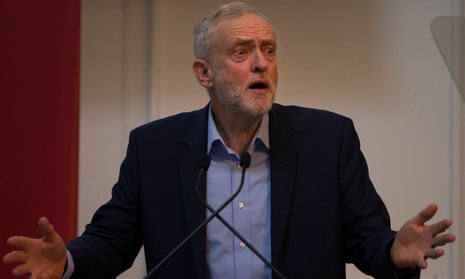In one sense, it is not the most enormous shock to find footballers’ pay is something on which Jeremy Corbyn disagrees with himself. A subject on which the Labour leader cannot hold two diametrically opposed opinions on the same day is increasingly a rarity. The problem with the new strategy of letting Jeremy be Jeremy is that – a bit like various football sides of cliché – you never know which one is going to turn up.
Last week Corbyn declared that there should be a cap on “grotesque” salaries. And whaddayaknow – the very first example of such salaries upon which he alighted was in football. “Certainly, the salaries that are paid to some footballers are simply ridiculous,” he stated, adding: “Some of the salaries paid to very high-earning top executives of companies are utterly ridiculous.”
Then, at the weekend, Corbyn seemed to have changed tack. His idea of a salary cap would not be extended to footballers, he told Andrew Marr, because they weren’t bosses. As he put it this time: “Footballers, while they are paid ludicrous sums of money which I suppose we all pay for through our tickets, in reality they’re employees for quite a short time with those clubs.” Mmm. You’ll note the quality of Jeremy’s mercy is strained.
At time of going to press, it was difficult to speculate which way the pendulum inside Jeremy’s noggin was swinging or, indeed, where it would be 48 hours hence. What can be said with certainty is that in all arguments about pay and equality – whoever is making them this week or any week – football should be right down anyone sensible’s list of give-a-tosses.
It is always telling when people who are supposed to have big ideas fall back on tipping all over the Premier League. I hate to break it to them but whingeing about footballers is not a big idea. They should have other fish to fry. Aside from anything else, top-flight football is one of the few engines of social mobility that still works in this country. Albeit for only a talented few, but hey – that already makes it more effective in this regard than almost every other profession. Yet it is footballer remuneration that is mentioned most frequently and most disparagingly by people in public life seeking to get attention.
What is it that they so detest about top-flight football, with its remorseless habit of creating working‑class millionaires? And so many black working-class millionaires, at that. I mean, really – of all the possible professions to pick, football would be one of my last ones, not least because it entertains so many people (however much they moan about it). It’s odd how you never hear politicians banging on about movie actors getting paid too much. Perhaps it’s because the working‑class actor is a more endangered species than it was even decades ago, so that branch of entertainment is not regarded as such a pressingly uppity problem.
And so it is that you frequently hear a footballer’s contract discussed in terms of how many NHS nurses it would fund, but weirdly never hear how many Mesut Özils a banking bailout or cocked-up Royal Mail flotation could have provided instead. That certainly says something about the way our society is structured – but not the thing that the anti-Premier League crowd think it says.
For my money, there is no clearer indication of a policy’s essential weakness than to find it primarily illustrated via recourse to the Premier League. Using footballers as an example for anything is the lamest sort of playing to the gallery, always indulged in by people too lazy or dim to formulate a proper argument. Furthermore, it always has the whiff of something patronisingly packaged to appeal to “ordinary people” in the sort of language “they” understand.

Indeed, instead of going along with it, I wish Corbyn had firmly resisted Marr’s reliance on that old footballing insult, “we pay your wages”. “We pay your wages” is such a loathsome sentiment. Some might think it more refined to say it on a TV show sofa, as opposed to scream it behind the goal, but it made me shudder even harder.
Those who think it’s OK to direct that comment at footballers should probably ask whether they’d toss it in the direction of serving staff in a restaurant they were eating in or a station cleaner who looked like they’d missed a bit. If they would, then at least they’re consistently unpleasant. If they wouldn’t, they need to dispense with the idea that the sums of money involved make it justifiable in one instance and not another. There are a few obvious exceptions to this rule – discovering your elected member of parliament has abused your trust and claimed moat-cleaning expenses and so on – but as a general principle it’s a cringeworthy thing to say.
As a man who gets paid an extra £62,440 from the public purse, supposedly for the task of leading Her Majesty’s opposition, it’s probably not one Corbyn ought wisely to get into.

